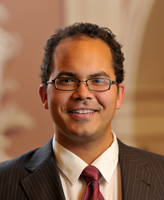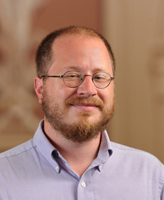Three Ph.D. candidates in the University of Notre Dame’s Department of Theology have recently been awarded prestigious fellowships from organizations such as the American Academy in Rome, Harvard University’s Dumbarton Oaks Research Library and Collection, the Dolores Zorhab Liebmann Foundation, and the Louisville Institute.
“Theology’s doctoral students have long been very competitive in winning prestigious doctoral and postdoctoral fellowships, as well as in gaining positions in elite universities such as Harvard or Oxford,” says Department of Theology Chair J. Matthew Ashley.
“We are very proud of these most recent exemplars of that trend, who provide eloquent testimony not only to the strength of those students we accept but also to the quality of the teachers and mentors who take them to the next level of scholarly excellence.”
Rediscovering a Voice

Albertus Horsting recently left for Italy on a Rome Prize fellowship from the American Academy in Rome. Out of more than 1,000 applicants each year, the academy selects just 30 “emerging artists and scholars in the early or middle stages of their careers who represent the highest standard of excellence in the arts and humanities.”
Horsting, who declined a Fulbright grant to Austria in order to accept the Rome Prize, says the honors were a welcome validation of his research, which sits on the threshold between classics and theology. “It’s not a typical project for a theologian,” he says. “It’s highly philological, highly textual work, so I was pleased to see that they wanted to support that kind of project.”
While in Rome, he will examine dozens of manuscripts in the Vatican Library and travel to other libraries across Italy, France, and Switzerland in an attempt to reconstruct the original version of a 5th century book of poems by Prosper of Aquitane, who was known as St. Augustine’s greatest promoter and defender.
The Liber Epigrammatum, a poetical synthesis of Augustine’s theology, was “one of the most widely read books during the Middle Ages” but is now largely forgotten, Horsting says. “I am preparing the first modern edition of the work, along with an English translation and commentary to elucidate its meaning. The end result is that this text—which has been obscured by time—is once again accessible and Prosper’s voice can be heard.”
Scriptural Poetics

Jeffrey Wickes has been named a junior fellow at Harvard University’s Dumbarton Oaks Research Library and Collection, which specializes in Byzantine studies, and a a Dolores Zorhab Liebmann Dissertation Fellow, which supports graduate research in the humanities, social sciences, and natural sciences.
A student in the department’s History of Christianity Ph.D. program, Wickes specializes in the history, languages, and theological lives of Christians who speak Syriac, a dialect of Aramaic (the language spoken by Jesus).
“My doctoral dissertation examines the use of Scripture in a hymn collection by a fourth-century poet known as Ephrem the Syrian,” Wickes says. “This hymn collection has never been translated into English but is the largest and, arguably, the most important of its kind in ancient Syriac literature.”
In translating and studying this collection, Wickes is focusing on what he calls scriptural poetics.
“These are metaphors through which we come to perceive God, the world, and our place in it—metaphors which are then reshaped within, and become the poetic, semantic, and lexical foundation of, Ephrem’s own poetic works.”
During his time at Notre Dame, Jeffrey has also worked on early Muslim-Christian interaction, early Eastern liturgy, medieval Latin hagiography and biblical exegesis, and the interaction between poetry and theology. He has presented at a number of conferences in the fields of patristics, Byzantine studies, and Syriac studies. Most recently, his paper on “The Poetics of Self-Presentation in Ephrem the Syrian’s Hymns on Faith” won the Nijmeh Kiraz Award for the best student presentation at the North American Syriac Symposium, Duke University.
Christianity and Immigration

Victor Carmona, a Ph.D. candidate in moral theology, received a Louisville Institute Dissertation Fellowship for 2011-2012. The program supports students whose projects have “the potential to strengthen the religious life of North American Christians and their institutions while simultaneously advancing American religious and theological scholarship.”
Carmona’s research examines U.S. immigration policy from the perspective of the Christian tradition’s understanding of partiality in neighborly love. “The project studies Thomas Aquinas’s order of charity and Gustavo Gutierrez’s preferential option for the poor,” he says, “because both understand that neighborly love implies making choices and acting accordingly.”
Based on these concepts, Carmona argues that partiality itself in U.S. immigration policy is not problematic—the question is whether U.S. immigration policy establishes the correct kind of partiality.
“My project will show that it does not,” he says, “because its principles are unable to account for poverty as a dimension of the familial and economic ties that exist between U.S. citizens, permanent residents, and foreigners. The continued presence of undocumented immigrants reflects this failure. Together, Gutierrez and Aquinas provide a mature sense of love and solidarity that will help us discern a more humane immigration policy that better accounts for these ties.”
Learn More >
- Department of Theology
- Theology Doctoral Program
- American Academy in Rome
- Dumbarton Oaks Research Library and Collection
- The Delores Zorhab Liebmann Fund
- The Louisville Institute
- Related story: Six Notre Dame Graduate Students Win Fulbright Awards in 2011 Competition
Originally published by at al.nd.edu on September 16, 2011.